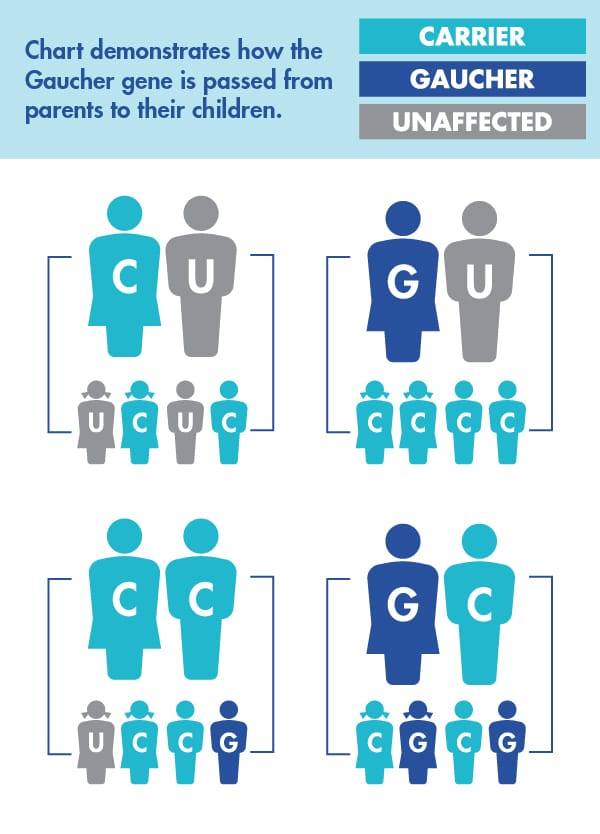How Is Gaucher Disease Inherited?
Gaucher disease is an autosomal recessive disorder. That means a person must receive the Gaucher gene from both parents in order to have the disease.
Most genes exist in pairs, with one coming from the mother and the other from the father. When one Gaucher gene in the pair is abnormal, the child is an asymptomatic carrier who can pass that abnormal gene to his or her children. When both genes in the pair are defective, a person will have Gaucher disease.
What does this mean for a parent who has Gaucher disease?
- If your partner does not have the Gaucher gene: Each of your children will be carriers.
- If your partner is a carrier of the Gaucher gene: Each child will have a 50 percent chance of having Gaucher disease and a 50 percent chance of being a carrier.
- If your partner also has Gaucher disease: Each of your children will have Gaucher disease.
The chart below shows how parents pass the Gaucher gene to their children.
What Is Gaucher Disease Carrier Status?
A person who has just one Gaucher gene is called a carrier. Carriers do not have Gaucher disease, nor do they experience symptoms. However, carriers can pass the Gaucher gene to their children.
When both parents are carriers, each pregnancy has a 1 in 4 chance that the baby will be born with Gaucher disease. A carrier having a child with someone who has Gaucher disease also increases the risk. Genetic counseling can help you understand these risks. Learn more about the genetics of Gaucher disease carrier status, or find out about prenatal screening and genetic counseling for Gaucher disease.
What If I Experience Symptoms?
A true carrier will not experience symptoms of Gaucher disease. If you have symptoms like enlarged spleen or severe bone pain, you may need retesting and/or evaluation for a different condition associated with these signs and symptoms.
Researchers have linked more than 400 genetic mutations to Gaucher disease. Doctors now screen for more genetic mutations than they did decades ago, so it is possible in rare cases that a person with Gaucher disease may have been misdiagnosed as a carrier. In these cases, an enzyme test called a beta-glucosidase leukocyte (BGL) test will generally show whether or not you have Gaucher disease. Find out more about testing for Gaucher disease.
Which Genetic Mutations Are Most Severe?
Scientists have identified more than 400 genetic mutations associated with Gaucher disease. Certain genetic mutations can cause more severe symptoms, but genetics alone do not determine disease severity.
Here are some factors scientists have identified about genetic mutations associated with Gaucher disease:
- Having 2 copies of the L444P mutation causes neurological symptoms and is related to Gaucher disease types 2 and 3.
- Patients with 1 copy of an N370S mutations plus another mutation almost certainly will have Gaucher disease type 1.
- Patients with 2 copies of the N370S mutation may have a milder form of Gaucher disease than people with just one N370S copy plus another mutation.
